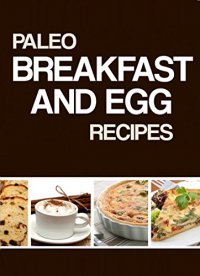Easy Paleo Diet Recipes for Breakfast & Eggs
What constitutes a healthy breakfast has been a controversial issue for years. Eggs and bacon were once demonized due to the fat-free and lower cholesterol craze in the latter half of the twentieth century.
Today it is understood that good quality fats are an essential parts of our diets, and its importance is slowly beginning to be accepted by our medical and nutritional communities. In fact 60% of our brains are fat. Good quality fats are needed for the formation of cell membranes, and fat is also needed to sustain collagen in our skin.
The benefits of good fats are diminished, however, when animals are raised in confinement and subjected to improper feeding practices, unsanitary living conditions, antibiotics, hormones and other chemicals that are commonplace in conventional farming practices. For instance, the difference in eating conventional bacon or eating pasture-raised organic bacon means the difference between putting healthy or bad fat into your body.
While good fats restore and promote health, bad fats can cause uncontrolled reactions in your body or inhibit other important metabolic processes. Just like fat is essential to life, good quality fat is the difference between health promotion and health destruction.
Grass-fed, raw butter is a miracle food and includes all the fats that you need for brain function, mental clarity and lubrication in your joints. You should use this liberally to cook your breakfast. The use of raw butter has been seen in countless indigenous cultures for health and vitality. If you can’t find raw butter, coconut oil can be a great substitute as it is very heat stable and can withstand high temperatures. Ghee, which is clarified butter, can also be a safe and healthy alternative.
Because eggs have been considered nature’s most perfect food, a note on their quality is also essential. Chickens raised in confinement are subjected to atrocious conditions and the quality of their eggs declines in vitamin and mineral content. For instance, pasture raised eggs contain 50-100% more folic acid than conventionally-raised eggs. Whether or not to eat the egg yolks has also been a matter of controversy, but it is now understood that eating the yolks is an incredibly important part of getting the largest benefit from your eggs. Egg yolks have 30% more folic and 10% more B12 than the whites. They also contain fat-soluble vitamins A, D, E and K and choline which is one of only elements in nature that will cleanse the liver. I make my morning shake using only the raw egg yolks as many have found the egg whites to be allergenic.
A final important consideration regarding conventional vs. pasture-raised eggs is that they contain the essential fatty acids omega 6 (linoleic acid) and omega 3 (linolenic acid). The ratio of these two fatty acids is critical to keeping inflammation in your body at bay. In organic, pasture-raised eggs, the ratio comes out as 2:1 and 3:1 (omega 6 to omega 3) but can be as high as 20:1 in conventionally-raised varieties. Because the amount of omega 6 is so abundant in the america diet, eating good quality eggs is a great way to restore the ratio balance.
Even if you don’t believe me, the differences in quality are very apparent when you break open the shell of conventional and organically raised eggs. An organic egg yolk from a chicken that has been allowed to eat it’s natural diet of grass and insects will contain a dark orange yolk, indicative of nutrient density in the eggs. Conventionally-raised eggs will be runny and the yolk will break easily. Good quality eggs and bacon for breakfast with a little raw butter provides a plethora of essential vitamins, minerals and nutrients to start your day off in the best possible way. There are many ways to prepare eggs for breakfast, but the quality of each egg is the





